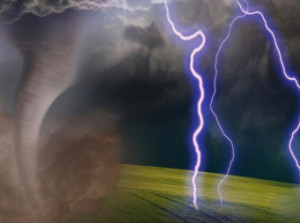Disaster Preparedness and Equine Evacuation
Click here to read the complete article426 – October, 2016
BY WILLIAM GIVEN
 Disaster preparedness for horses requires special considerations. We must take into account the fact that our horses are intelligent, emotional and social animals, and as such should be treated as individuals. Natural disasters like hurricanes and tornadoes and man-caused emergencies such as train derailments and hazardous material spills can take many forms and can occur virtually anywhere, from Maine to Hawaii and from Alaska to Florida. You are not going to have to worry much about flooding if you live in Leadville, Colorado (elevation 10,152 feet above sea level) but you sure will if you call Gulfport, Mississippi home. A horse owner in Billings, Montana will likely never feel the effect of a hurricane but it should definitely be a consideration if you live in Miami, Florida. The time between the formation of a funnel cloud and the touching down of a tornado can be mere minutes, and tornadoes can be wickedly destructive. If you live in or
Disaster preparedness for horses requires special considerations. We must take into account the fact that our horses are intelligent, emotional and social animals, and as such should be treated as individuals. Natural disasters like hurricanes and tornadoes and man-caused emergencies such as train derailments and hazardous material spills can take many forms and can occur virtually anywhere, from Maine to Hawaii and from Alaska to Florida. You are not going to have to worry much about flooding if you live in Leadville, Colorado (elevation 10,152 feet above sea level) but you sure will if you call Gulfport, Mississippi home. A horse owner in Billings, Montana will likely never feel the effect of a hurricane but it should definitely be a consideration if you live in Miami, Florida. The time between the formation of a funnel cloud and the touching down of a tornado can be mere minutes, and tornadoes can be wickedly destructive. If you live in or
around Tulsa, Oklahoma, the tornado is what you should plan for. Being prepared and practiced for an emergency will significantly lower your level of fear and allow you to react instinctively and without hesitation.
During a natural disaster or some other type of emergency, the time you have to evacuate your horse will be limited. Since you may not have a great amount of time to think let alone act, take the time now to prepare an emergency plan. If you have a well thought out emergency evacuation plan, you should have sufficient time to transport your horse to safety well beyond the danger zone of the disaster. It is often wise to leave in advance of a mandatory evacuation order. If you have several horses and only one trailer, and will have to make several trips, you cannot possibly put evacuation off. Accept the fact that you may not have sufficient time to get back for your other horses and be prepared to make the hard decision of which you will transport to safety first. If you wait until the last minute to evacuate, the roads will be much more congested or you could be told by emergency management personnel that you must leave your animals behind. State and local emergency management agencies must give first consideration to human life, and in emergency situations we must be prepared to follow their instructions and not create an additional risk for emergency responders. And, once you leave your home, you have little way of knowing just how long it may be before you will be allowed to return. If left behind, your horse’s chance for survival diminishes. The lack of food and water, combined with the weather and environment will take its toll. In order to avoid this situation, we are offering these helpful hints.
Helpful Hints for Equine Evacuation
You must have a place to go. Know where you can take your horse in the event of a mandatory or even general evacuation order. Make arrangements with friends or other horse owners outside of your area to provide stabling in the event of a natural disaster or some other type of emergency. Depending on your evacuation plan and where you plan to go, you can contactthe county’s agricultural extension agent or emergency management authorities for information about emergency stabling facilities in their area. You may also want to contact boarding stables or the county fairgrounds for information on their polices about accepting horses during an emergency. Stockyards and livestock sales yards, as well as racetracks and show venues may also make their facilities available during a disaster. It is important that you have several options. You should be familiar with several different routes to the facility to which you will be evacuating your horse.
426 – October, 2016










